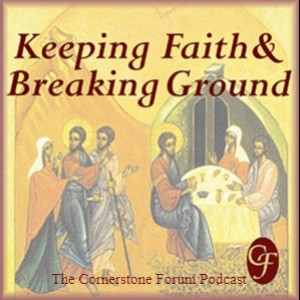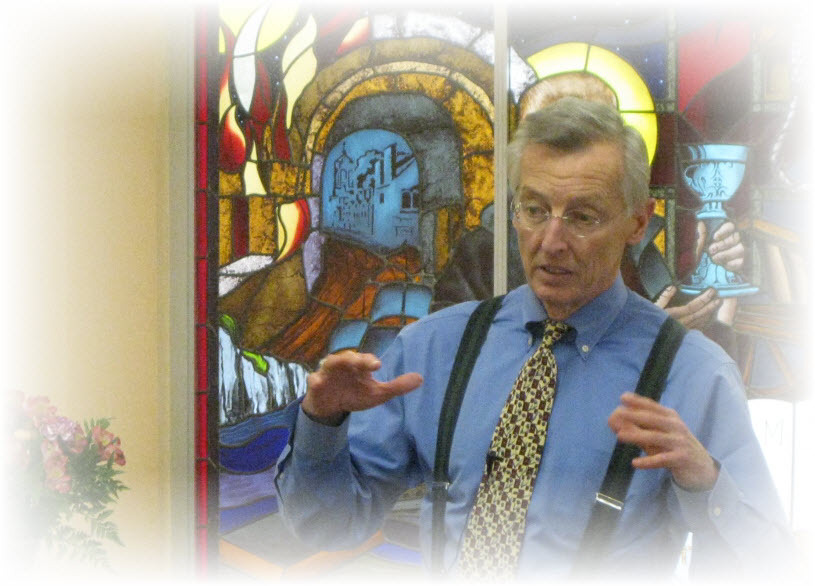Episodes

Saturday Oct 09, 2021
Saturday Oct 09, 2021
This series originally recorded in 1995 began with a presentation on Mark Twain’s posthumously published “The United States of Lyncherdom”. It was later thought that, although a valuable piece, it would be better presented on its own and not used as an introduction to the Gospel of Luke. However, you will hear an occasional reference to this at points in these reflections.
The author of the Gospel of Luke and the Acts of the Apostles, St. Luke, is traditionally known as a sophisticated non-Jew Hellenist and perhaps a physician. He was an early convert to the Christian faith, most likely through the preaching of St. Paul. But, as Gil Bailie points out in this presentation, Luke is above all a gifted teller of tales – or rather a re-teller of tales. The stories in Luke’s gospel are vivid and distinctive among the synoptic gospels.

Friday Oct 08, 2021
Friday Oct 08, 2021
This series originally recorded in 1995 began with a presentation on Mark Twain’s posthumously published “The United States of Lyncherdom”. It was later thought that, although a valuable piece, it would be better presented on its own and not used as an introduction to the Gospel of Luke. However, you will hear an occasional reference to this at points in these reflections.
The author of the Gospel of Luke and the Acts of the Apostles, St. Luke, is traditionally known as a sophisticated non-Jew Hellenist and perhaps a physician. He was an early convert to the Christian faith, most likely through the preaching of St. Paul. But, as Gil Bailie points out in this presentation, Luke is above all a gifted teller of tales – or rather a re-teller of tales. The stories in Luke’s gospel are vivid and distinctive among the synoptic gospels.

Thursday Oct 07, 2021
Thursday Oct 07, 2021
This series originally recorded in 1995 began with a presentation on Mark Twain’s posthumously published “The United States of Lyncherdom”. It was later thought that, although a valuable piece, it would be better presented on its own and not used as an introduction to the Gospel of Luke. However, you will hear an occasional reference to this at points in these reflections.
The author of the Gospel of Luke and the Acts of the Apostles, St. Luke, is traditionally known as a sophisticated non-Jew Hellenist and perhaps a physician. He was an early convert to the Christian faith, most likely through the preaching of St. Paul. But, as Gil Bailie points out in this presentation, Luke is above all a gifted teller of tales – or rather a re-teller of tales. The stories in Luke’s gospel are vivid and distinctive among the synoptic gospels.

Wednesday Oct 06, 2021
Wednesday Oct 06, 2021
This series originally recorded in 1995 began with a presentation on Mark Twain’s posthumously published “The United States of Lyncherdom”. It was later thought that, although a valuable piece, it would be better presented on its own and not used as an introduction to the Gospel of Luke. However, you will hear an occasional reference to this at points in these reflections. A link to the public domain Twain essay is provided above.
The author of the Gospel of Luke and the Acts of the Apostles, St. Luke, is traditionally known as a sophisticated non-Jew Hellenist and perhaps a physician. He was an early convert to the Christian faith, most likely through the preaching of St. Paul. But, as Gil Bailie points out in this presentation, Luke is above all a gifted teller of tales – or rather a re-teller of tales. The stories in Luke’s gospel are vivid and distinctive among the synoptic gospels.

Tuesday Oct 05, 2021
Tuesday Oct 05, 2021
Think nowHistory has many cunning passages, contrived corridorsAnd issues, deceives with whispering ambitions,Guides us by vanities. Think nowShe gives when our attention is distractedAnd what she gives, gives with such supple confusionsThat the giving famishes the craving
T S Eliot - Gerontion
It has been said that a “celebrity is someone who is famous for being well known”. It is a definition that underscores one of the most curious aspects of contemporary life. As uniquely modern as it is however, fascination for those whose chief distinction is that large numbers of people are fascinated by them goes all the way back to the dawn of human culture.
With each passing day, however, it is becoming clearer that the evermore vertiginous 'fame, fad, fanfare' phenomenon that has come to dominate popular culture is a symptom of a deepening spiritual, social and psychological crisis. In order to understand this crisis and to appreciate how uniquely Christian spirituality and Christian discipleship address its underlying malaise we will undertake an historical survey of the anthropological and psychological role that fame has played in human affairs.
Using this survey as a backdrop Gil Bailie rethinks our social and psychological presuppositions and ponders anew the anthropological and psychological implications of Christian conversion.

Monday Oct 04, 2021
Monday Oct 04, 2021
Think nowHistory has many cunning passages, contrived corridorsAnd issues, deceives with whispering ambitions,Guides us by vanities. Think nowShe gives when our attention is distractedAnd what she gives, gives with such supple confusionsThat the giving famishes the craving
T S Eliot - Gerontion
It has been said that a “celebrity is someone who is famous for being well known”. It is a definition that underscores one of the most curious aspects of contemporary life. As uniquely modern as it is however, fascination for those whose chief distinction is that large numbers of people are fascinated by them goes all the way back to the dawn of human culture.
With each passing day, however, it is becoming clearer that the evermore vertiginous 'fame, fad, fanfare' phenomenon that has come to dominate popular culture is a symptom of a deepening spiritual, social and psychological crisis. In order to understand this crisis and to appreciate how uniquely Christian spirituality and Christian discipleship address its underlying malaise we will undertake an historical survey of the anthropological and psychological role that fame has played in human affairs.
Using this survey as a backdrop Gil Bailie rethinks our social and psychological presuppositions and ponders anew the anthropological and psychological implications of Christian conversion.

Sunday Oct 03, 2021
Sunday Oct 03, 2021
Think nowHistory has many cunning passages, contrived corridorsAnd issues, deceives with whispering ambitions,Guides us by vanities. Think nowShe gives when our attention is distractedAnd what she gives, gives with such supple confusionsThat the giving famishes the craving
T S Eliot - Gerontion
It has been said that a “celebrity is someone who is famous for being well known”. It is a definition that underscores one of the most curious aspects of contemporary life. As uniquely modern as it is however, fascination for those whose chief distinction is that large numbers of people are fascinated by them goes all the way back to the dawn of human culture.
With each passing day, however, it is becoming clearer that the evermore vertiginous 'fame, fad, fanfare' phenomenon that has come to dominate popular culture is a symptom of a deepening spiritual, social and psychological crisis. In order to understand this crisis and to appreciate how uniquely Christian spirituality and Christian discipleship address its underlying malaise we will undertake an historical survey of the anthropological and psychological role that fame has played in human affairs.
Using this survey as a backdrop Gil Bailie rethinks our social and psychological presuppositions and ponders anew the anthropological and psychological implications of Christian conversion.

Saturday Oct 02, 2021
Saturday Oct 02, 2021
Think nowHistory has many cunning passages, contrived corridorsAnd issues, deceives with whispering ambitions,Guides us by vanities. Think nowShe gives when our attention is distractedAnd what she gives, gives with such supple confusionsThat the giving famishes the craving
T S Eliot - Gerontion
It has been said that a “celebrity is someone who is famous for being well known”. It is a definition that underscores one of the most curious aspects of contemporary life. As uniquely modern as it is however, fascination for those whose chief distinction is that large numbers of people are fascinated by them goes all the way back to the dawn of human culture.
With each passing day, however, it is becoming clearer that the evermore vertiginous 'fame, fad, fanfare' phenomenon that has come to dominate popular culture is a symptom of a deepening spiritual, social and psychological crisis. In order to understand this crisis and to appreciate how uniquely Christian spirituality and Christian discipleship address its underlying malaise we will undertake an historical survey of the anthropological and psychological role that fame has played in human affairs.
Using this survey as a backdrop Gil Bailie rethinks our social and psychological presuppositions and ponders anew the anthropological and psychological implications of Christian conversion.

Friday Oct 01, 2021
Friday Oct 01, 2021
Think nowHistory has many cunning passages, contrived corridorsAnd issues, deceives with whispering ambitions,Guides us by vanities. Think nowShe gives when our attention is distractedAnd what she gives, gives with such supple confusionsThat the giving famishes the craving
T S Eliot - Gerontion
It has been said that a “celebrity is someone who is famous for being well known”. It is a definition that underscores one of the most curious aspects of contemporary life. As uniquely modern as it is however, fascination for those whose chief distinction is that large numbers of people are fascinated by them goes all the way back to the dawn of human culture.
With each passing day, however, it is becoming clearer that the evermore vertiginous 'fame, fad, fanfare' phenomenon that has come to dominate popular culture is a symptom of a deepening spiritual, social and psychological crisis. In order to understand this crisis and to appreciate how uniquely Christian spirituality and Christian discipleship address its underlying malaise we will undertake an historical survey of the anthropological and psychological role that fame has played in human affairs.
Using this survey as a backdrop Gil Bailie rethinks our social and psychological presuppositions and ponders anew the anthropological and psychological implications of Christian conversion.

Thursday Sep 30, 2021
Thursday Sep 30, 2021
Think nowHistory has many cunning passages, contrived corridorsAnd issues, deceives with whispering ambitions,Guides us by vanities. Think nowShe gives when our attention is distractedAnd what she gives, gives with such supple confusionsThat the giving famishes the craving
T S Eliot - Gerontion
It has been said that a “celebrity is someone who is famous for being well known”. It is a definition that underscores one of the most curious aspects of contemporary life. As uniquely modern as it is however, fascination for those whose chief distinction is that large numbers of people are fascinated by them goes all the way back to the dawn of human culture.
With each passing day, however, it is becoming clearer that the evermore vertiginous 'fame, fad, fanfare' phenomenon that has come to dominate popular culture is a symptom of a deepening spiritual, social and psychological crisis. In order to understand this crisis and to appreciate how uniquely Christian spirituality and Christian discipleship address its underlying malaise we will undertake an historical survey of the anthropological and psychological role that fame has played in human affairs.
Using this survey as a backdrop Gil Bailie rethinks our social and psychological presuppositions and ponders anew the anthropological and psychological implications of Christian conversion.

Keeping Faith & Breaking Ground
Without Christianity neither the nature of the present crisis of culture nor the meaning of history itself can be properly comprehended. If the Christian revelation is to come to our aid in this moment of peril, we must learn to account for its sweeping claims in ways that are faithful to Church teachings, intellectually cogent, morally rigorous, charitable, anthropologically sound, and undeterred by the moribund spirit of our age.



